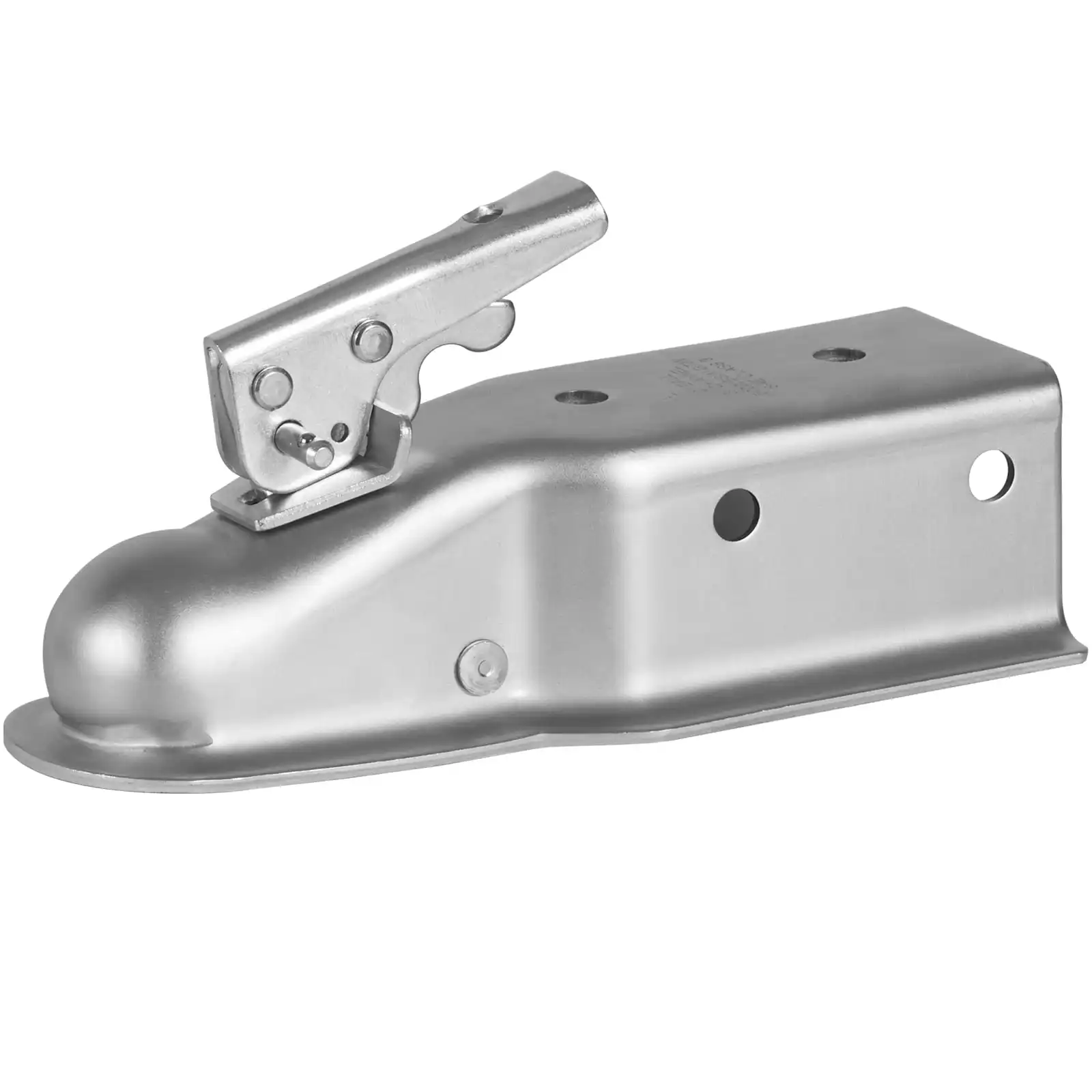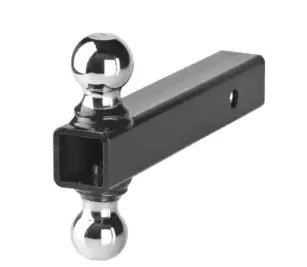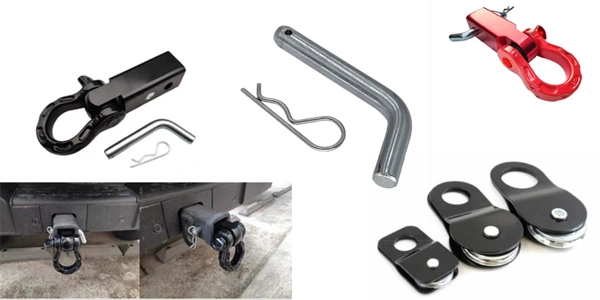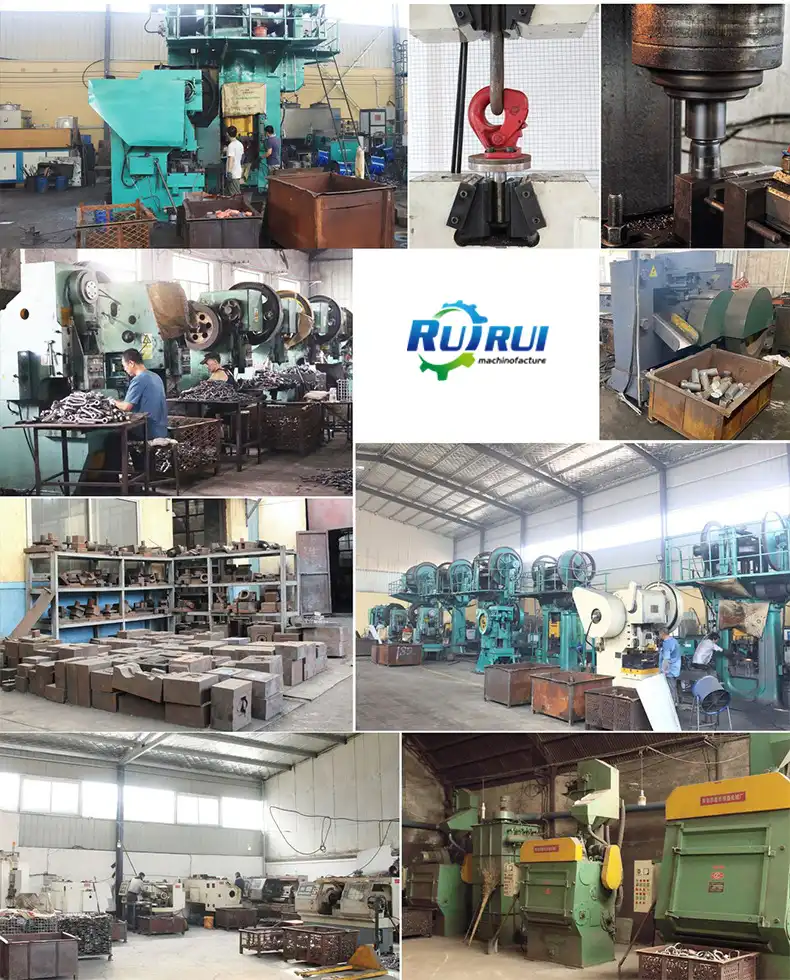Best Trailer Coupler for Boat Trailer: Saltwater-Friendly Choices
2025-11-25 15:20:27
Picture this: you're at the boat ramp after a perfect day on the water, ready to load up and head home, when you discover your trailer coupler has seized from saltwater corrosion. The latch won't budge, rust has eaten through critical components, and what should be a simple five-minute process turns into an hours-long ordeal. This nightmare scenario plays out far too often for saltwater boaters who underestimate the destructive power of marine environments on their trailer equipment. Choosing the Best Trailer Coupler for Boat Trailer use in saltwater conditions isn't just about convenience—it's about safety, reliability, and protecting your investment from the relentless assault of corrosion that can compromise your entire towing setup.

Understanding Trailer Couplers for Marine Applications
When selecting the Best Trailer Coupler for Boat Trailer applications, understanding the fundamental types and their suitability for saltwater environments becomes paramount. Trailer couplers serve as the critical connection point between your tow vehicle and boat trailer, and their performance directly impacts safety and functionality. The marine environment presents unique challenges that standard couplers simply cannot withstand over extended periods.
Types of Boat Trailer Couplers and Their Saltwater Performance
Straight-tongue couplers represent the most common configuration for boat trailers, mounting directly onto a single steel tube frame. These couplers work exceptionally well for small to medium-sized boats and offer straightforward installation. When searching for the Best Trailer Coupler for Boat Trailer saltwater use, straight-tongue designs manufactured from marine-grade materials provide reliable performance. The simplicity of their design means fewer crevices where salt can accumulate, though the mounting channel still requires regular maintenance and protective coatings to prevent deterioration. A-frame couplers distribute towing forces across two frame members, creating superior stability for heavier boats and larger trailers. The Best Trailer Coupler for Boat Trailer heavy-duty applications often features this design, as it handles the dynamic loads encountered during saltwater launches more effectively. The dual-frame connection provides redundancy that proves valuable in marine environments where corrosion might compromise individual components. However, the increased surface area and additional joints require more diligent maintenance protocols to ensure saltwater doesn't penetrate mounting points and accelerate structural degradation.
Material Selection for Corrosion Resistance
The material composition of your boat trailer coupler determines its lifespan in saltwater conditions more than any other single factor. Carbon steel couplers with electro-galvanized finishes represent the industry standard for the Best Trailer Coupler for Boat Trailer marine use, offering excellent corrosion resistance when properly maintained. The galvanization process creates a protective zinc coating that sacrifices itself to protect the underlying steel, similar to how sacrificial anodes protect boat components. This coating withstands regular saltwater immersion when supplemented with appropriate post-use rinsing and protective treatments. Stainless steel construction provides premium corrosion resistance for boat trailer couplers, though at significantly higher cost. Marine-grade stainless alloys resist pitting and crevice corrosion that devastates lesser materials in saltwater environments. For boaters who frequently launch in saltwater or store trailers in coastal areas with salt-laden air, investing in stainless steel components for the Best Trailer Coupler for Boat Trailer applications delivers long-term value through reduced maintenance requirements and extended service life. The superior corrosion resistance eliminates the need for frequent replacements that plague standard steel couplers in harsh marine conditions.
Critical Features for Saltwater-Resistant Trailer Couplers
Identifying the Best Trailer Coupler for Boat Trailer saltwater use requires evaluating specific design features that enhance corrosion resistance and maintain functionality despite harsh marine exposure. Modern marine-grade couplers incorporate engineering solutions that address the unique challenges of saltwater environments while maintaining the strength and reliability demanded by towing applications.
Latch Mechanisms and Corrosion Protection
The latch mechanism represents the most vulnerable component in any trailer coupler system, with moving parts particularly susceptible to saltwater corrosion and seizure. Lever-lock designs with lockable handles provide secure attachment while offering easier operation than traditional mechanisms, even when salt begins to accumulate. The Best Trailer Coupler for Boat Trailer marine applications incorporates adjustable nuts that allow custom fitting to your hitch ball, compensating for wear and ensuring tight connections throughout the coupler's service life. Quick-release features prove invaluable when launching in saltwater, as they minimize the time your hands spend manipulating potentially corroded metal components. Posi-lock and easy-lock latches dominate the boat trailer market due to their reliability and user-friendly operation. These self-latching mechanisms automatically secure when the coupler engages the hitch ball, reducing human error that could result in separation during transit. For the Best Trailer Coupler for Boat Trailer reliability, these latching systems must feature sealed bearing surfaces and protected spring mechanisms that resist saltwater intrusion. Regular application of marine-grade grease to latch pivot points maintains smooth operation and displaces moisture that would otherwise accelerate corrosion, extending functional life even under demanding saltwater conditions.
Weight Capacity and Load Distribution
Selecting the Best Trailer Coupler for Boat Trailer applications demands careful attention to weight ratings that exceed your actual towing requirements. Marine trailers experience dynamic loading during launches and recoveries that can momentarily exceed static tongue weights, particularly on steep ramps or in rough water conditions. Professional recommendations suggest choosing couplers rated at least twenty-five percent above your calculated tongue weight to provide safety margins that account for these dynamic forces and any future boat upgrades that might increase overall weight. Class ratings provide standardized weight categories that simplify coupler selection for boat trailer applications. Class I couplers handle up to two thousand pounds gross trailer weight, suitable for small fishing boats and personal watercraft. Class II extends to three thousand five hundred pounds, accommodating most recreational boats under twenty feet. For serious saltwater fishing boats and larger vessels, Class III and IV couplers rated up to ten thousand pounds or more deliver the structural integrity required for safe towing. The Best Trailer Coupler for Boat Trailer heavy-duty applications incorporates reinforced mounting channels and oversized bearing surfaces that distribute loads effectively while resisting the additional stress of saltwater corrosion on structural components.

Maintenance and Protection Strategies for Marine Couplers
Even the Best Trailer Coupler for Boat Trailer applications requires proactive maintenance to achieve its designed service life in saltwater environments. The combination of immersion during launches, salt spray during transport, and atmospheric exposure during storage creates a perfect storm for accelerated corrosion that can compromise even premium components without proper care protocols.
Post-Use Cleaning and Rinsing Procedures
Immediate freshwater rinsing after every saltwater use represents the single most effective maintenance practice for preserving boat trailer couplers and associated hardware. The crystalline structure of dried salt holds moisture against metal surfaces while its chemical composition accelerates electrochemical corrosion processes that degrade even protected materials. Professional marine technicians recommend stopping at freshwater boat ramps when returning from saltwater outings to perform preliminary rinsing before salt has opportunity to dry and bond to trailer components. This practice proves especially critical for the coupler assembly, where the combination of mechanical stress and saltwater exposure creates particularly aggressive corrosion conditions. Thorough washing with soap and high-pressure water ensures complete salt removal from the coupler's crevices and hidden surfaces where simple rinsing cannot reach. Using specialized products designed to break down salt enzymes provides additional protection, as these formulations neutralize the corrosive compounds rather than merely washing them away. The Best Trailer Coupler for Boat Trailer longevity benefits from brushing the latch mechanism, adjustment threads, and mounting surfaces with soft-bristled brushes during washing, dislodging salt deposits before they crystallize and create corrosion initiation sites. Complete drying after washing prevents water from becoming trapped in enclosed spaces where it would promote continued corrosion between uses.
Protective Coatings and Lubrication
Application of rust-preventive sprays and moisture-displacing lubricants after each saltwater exposure creates protective barriers that repel water and prevent oxygen from reaching metal surfaces. Products specifically formulated for marine applications contain corrosion inhibitors that actively neutralize salt residue while providing long-lasting protection between uses. For the Best Trailer Coupler for Boat Trailer protection, generous application to all exposed surfaces ensures complete coverage, as thin or incomplete coatings allow salt water to penetrate and attack vulnerable areas underneath the protective layer. Marine-grade grease applied to latch mechanisms, adjustment threads, and bearing surfaces serves dual purposes of maintaining smooth mechanical operation while sealing out moisture and contaminants. The thick consistency of marine grease adheres to vertical and overhead surfaces better than light oils, providing persistent protection even during submersion at boat ramps. Seasonal deep maintenance should include complete disassembly of the coupler latch mechanism for thorough cleaning, inspection, and re-lubrication with fresh marine grease. The Best Trailer Coupler for Boat Trailer reliability depends on this proactive approach, as waiting until mechanical problems develop often means corrosion has already compromised internal components beyond simple cleaning and lubrication.

Selecting the Right Coupler for Your Saltwater Boating Needs
Making an informed decision about the Best Trailer Coupler for Boat Trailer saltwater applications requires balancing multiple factors including your specific boat configuration, typical launch conditions, frequency of saltwater exposure, and budget constraints. The right choice provides reliable service for years while minimizing maintenance demands and replacement costs associated with premature corrosion failure.
Matching Couplers to Trailer Configuration
The physical configuration of your boat trailer tongue dictates which coupler styles can be properly installed and function safely. Straight-tongue trailers with single-tube construction require channel-mount couplers that bolt directly to the tongue tube, with channel width matching your specific trailer frame dimensions. Standard sizes include two-inch and three-inch widths, though custom sizing exists for specialized applications. The Best Trailer Coupler for Boat Trailer straight-tongue installations must feature sufficient adjustment range to properly position the coupler at the optimal height for level towing, as improper height creates handling problems and accelerates tire wear on both trailer and tow vehicle. A-frame trailer configurations demand couplers specifically engineered for the standard fifty-degree frame angle where the two tongue members converge. Weld-on A-frame couplers provide the strongest installation but require professional welding equipment and expertise, while bolt-on variants offer easier replacement capability for boaters who perform their own maintenance. The Best Trailer Coupler for Boat Trailer A-frame applications distributes mounting loads across both frame members through properly designed bolt patterns that prevent stress concentrations which could crack frames or pull mounting hardware loose. Ensuring proper fit prevents operational problems and premature failure that compromises safety during saltwater launches where challenging conditions demand maximum reliability from all towing components.
Ball Size and Class Rating Considerations
Hitch ball diameter represents a critical specification that must match exactly between your tow vehicle's hitch and trailer coupler for safe operation. Common sizes include one and seven-eighths inch for lighter boats, two inches for medium recreational boats, and two and five-sixteenths inches for heavier offshore fishing boats and larger vessels. Using mismatched components creates dangerous looseness or prevents proper latching, both of which can result in trailer separation during transit. The Best Trailer Coupler for Boat Trailer safety always specifies ball size clearly, with markings visible on the coupler body that eliminate any confusion during installation or when switching between tow vehicles. Class ratings provide standardized weight capacity classifications that guide appropriate coupler selection based on your boat trailer's gross weight. Calculating tongue weight accurately requires weighing your fully loaded trailer including boat, motor, fuel, equipment, and gear at typical operating configuration. Professional recommendations suggest tongue weight should equal ten to fifteen percent of total trailer weight for proper balance and handling characteristics. The Best Trailer Coupler for Boat Trailer performance requires selecting components rated well above your calculated requirements, providing safety margins that account for dynamic loading during launches, rough road conditions, and the structural weakening effects of even minor corrosion in saltwater environments.

Conclusion
Selecting the Best Trailer Coupler for Boat Trailer saltwater applications demands careful consideration of materials, design features, and maintenance requirements that ensure reliable performance despite aggressive marine corrosion. Marine-grade construction with proper coatings, appropriate weight ratings, and user-friendly latch mechanisms provide the foundation for safe, trouble-free boating experiences.
Cooperate With Qingdao RUIRUI Machinary Co., LTD.
As a leading China Best Trailer Coupler for Boat Trailer manufacturer and China Best Trailer Coupler for Boat Trailer supplier, Qingdao RUIRUI Machinery Co., LTD. specializes in producing High Quality Best Trailer Coupler for Boat Trailer components through advanced metal fabrication technologies. Our factory combines progressive stamping, CNC machining, and premium surface treatments including electro-galvanizing, powder coating, and anodizing to deliver corrosion-resistant trailer accessories that excel in demanding saltwater environments. With ISO-certified quality systems and over fifteen years of manufacturing expertise, we provide competitive Best Trailer Coupler for Boat Trailer price points for wholesale orders while maintaining the strict tolerances and material specifications required for marine applications. Our China Best Trailer Coupler for Boat Trailer factory produces Best Trailer Coupler for Boat Trailer for sale to over eighty countries, supporting boat trailer manufacturers and distributors with reliable supply chain partnerships and customization capabilities for specialized requirements. Contact our technical team at info@qdkshd.com to discuss your trailer component specifications, request samples of our marine-grade products, and discover how our comprehensive manufacturing capabilities can optimize your sourcing strategy for premium boat trailer accessories.
References
1. Charlton, Kevin. "Understanding Trailer Coupler Types and Marine Applications." Strictly Trailers Technical Manual, 2023.
2. Johnson, Timothy. "Corrosion Prevention Systems for Marine Trailer Equipment." Marine Equipment Maintenance Journal, 2024.
3. Anderson, Michael. "Structural Loading Analysis for Boat Trailer Coupling Systems." Society of Automotive Engineers Technical Paper Series, 2023.
4. Roberts, David. "Galvanic Corrosion in Saltwater Marine Environments." Corrosion Science Quarterly, Volume 45, 2024.
5. Thompson, Sarah. "Materials Selection for Corrosion-Resistant Trailer Hardware." Journal of Marine Engineering and Technology, 2023.
Send Inquiry
You may like
